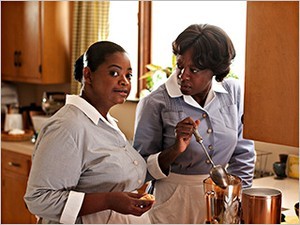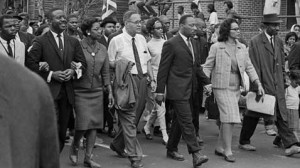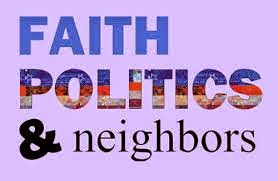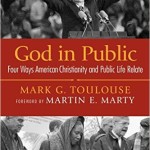
The second is the story of the maids (the help) who worked in the homes of the well-to-do in Jackson, Mississippi just a few years before Civil Rights laws came into effect. It was an intriguing study of American history, of American culture condensed into two evenings of storytelling. I recommend it. But I warn you, it’s pretty uncomfortable.
Past treatment of our Black citizens is part of the American family story that embarrasses us now. I daresay, many of us good-hearted Christian people look back and wonder how on earth - in this nation we love - could so many people have been so blind for so many years. There’s the first irony: this country of liberty and equality was built on the backs of slaves. Then a second paradox: there was a brutal deadly war fought over whether or not to continue the ugly business of slavery. Then for years after that, “separate but equal” was considered to be an appropriate and even godly way to order our society.
Thank goodness our laws have evolved over these 200+ years to reflect a more just understanding of human relationships in this country. For example, consider our labor laws (since we are celebrating Labor Day this weekend). Thank goodness, we finally have laws that protect our children, protect our health, designate a minimum wage, regulate safety conditions in the workplace and ensure equal access to the workplace for women, people of color and people with disabilities.
Thank goodness our laws have evolved over these 200+ years to reflect a more authentic actuality of the founding visions of this nation. Even though the founders did not allow women to vote; even though they allowed slavery to be part of the DNA of this nation, still they implanted genius ideals of justice and equality that have enabled this country to grow and change and become better over the years.
The whole reason we have laws, I think, is because we don’t have enough love. People tend to avoid doing the loving, giving thing for others. Authentic love is counter-cultural in our human cultures, and so societies have always had to legislate how people should treat one another. Governments must pass laws in order to make sure we treat each other right and act appropriately in our various human relationships.
Jesus and the apostle Paul taught that love is the fulfillment of law. If we would love our neighbors as ourselves; if we would do unto others as we would have them do to us, then commandments and statutes wouldn't be necessary.
But where and when is that going to happen?
For example, in the earliest days, a significant stream of the church was pacifist. But in America during World War One, preachers across the land, in both liberal and conservative congregations, pounded their pulpits and insisted it was a “Christian duty” to enlist and go kill the enemy.
Toulouse looks closely at the history of the American church’s relationship to its government and he describes several past and current approaches that are not helpful; ways that are not at all appropriate for mixing religion and politics.
But there are some ways he would recommend to Christians and churches as healthy options, ways that religious influence can appropriately affect the course of secular governments.
In his explanation, Toulouse describes what he calls “public Christian” and “public church.”
When Christians truly stand in a public Christian or a public church orientation to public life, they represent a strand of Christian understanding and theological concern not primarily rooted in cultural identities. They don’t speak or act as Republicans or Democrats or even as Presbyterians or Baptists. They do not speak as Christians who are primarily concerned with American or denominational politics.
When we read Paul’s wisdom to the Roman Christians of the First Century, we remember that they lived under the whims of capricious emperors and we recall how Paul himself was persecuted and martyred by his own government because of his faith. American Christians are fortunate to live under a Constitution that guarantees our freedom to vote and speak and protest and express our faith in the public arena.Rather they speak as Christians who believe in the meaning of the gospel. They believe that the gospel carries with it implications for how human beings, in all their individual and social relationships, treat one another…. Thus when [public Christians] speak or act in public life, they seek to move it toward a greater realization of … the kind of justice found in the Hebrew Bible and the Christian gospel.
The public Christian (Toulouse explains) desires to speak about God in public ways that influence how citizens – not just Christians – think about things.It was in large part the voices of public Christians and the public church that worked together with a broad coalition of other activists
 to
abolish slavery, to demand the civil rights of Black citizens, to
influence child labor laws, to advocate for workers’ compensation
protections …and on and on and on. The Christian voice has made a huge
difference in this land that we love. The church’s influence has helped
change our world.
to
abolish slavery, to demand the civil rights of Black citizens, to
influence child labor laws, to advocate for workers’ compensation
protections …and on and on and on. The Christian voice has made a huge
difference in this land that we love. The church’s influence has helped
change our world.But there is another voice now prominent in the public conversation of America. What concerns me about this voice is that it is totally devoid of a concept of the wider social community; it is completely dismissive of Christ’s demand that we “love our neighbors as we love ourselves;” that we should do whatever we can to care for God’s little ones; that we ought to go to some trouble and put ourselves at risk in order to care for those in God’s beloved flock who may be lost and struggling.
In this approach, instead of community what we hear is a voice of insiders protecting their privilege. Instead of compassion, it is a voice of the powerful shouting down the whispers of the unemployed and the underemployed - neighbors who want a decent job and a decent wage and a little respect. Instead of justice and equity, it is a voice of greed.
In today’s America, where is the authentic Christian voice that will help move our public life “toward a greater realization of … the kind of justice found in the Hebrew Bible and the Christian gospel?”
Paul’s Christians did not get to vote or speak out in public against the abuses of their society. But we live in a democracy that not only invites - it demands our participation.
Jeffrey Stout has said:
Democracy … takes for granted that reasonable people will differ in their conceptions of piety, in their grounds for hope, in their ultimate concerns, and in their speculations about salvation. Yet democracy holds that people who differ on such matters can still exchange reasons with one another intelligibly, cooperate in crafting political arrangements that promote justice and decency in their relations with one another, and do both of these things without compromising their integrity …Too much of our current national conversation is mean and divisive. Too many public people are not engaged in reasonable exchange of ideas or cooperative efforts. Too many public servants do not seem to be interested in promoting justice.
Where is the voice of the public prophet calling for love, justice, compassion and mercy?
Who will speak for the “little ones?”
Who will stand up for the vulnerable, the despised and disrespected?
Where did the Black maids go when they had been mistreated by their employers and their society? They didn’t have legal recourse back then so they went to church. Those whom the world had beat down, the church held up.
“We are not wrong,” the Rev Dr Martin Luther King Jr. told God’s ‘little ones’ gathered at the Holt Street Baptist Church on the evening of December 5, 1955; because:
…if we are wrong, the Supreme Court of this nation is wrong. If we are wrong, the Constitution of the United States is wrong. If we are wrong, God Almighty is wrong. So let us fight until justice rolls down like waters.This Labor Day let us celebrate all those who have worked so hard to make America strong. But let’s not just wave our flags and mouth our platitudes. Rather let us be a people who get our hands dirty actually working for the ideals this flag and this country stand for.

Let us be bold to raise our voices and challenge our government to keep the nation’s promise to those who are most vulnerable. Let us recommit ourselves to advocate on behalf of all those who want to be working right now but can’t find jobs; all those who have worked hard their whole life but now find themselves dismissed and disregarded; all those who do the really important work in our society but find they are disrespected and undervalued; all those who must work two and three jobs just to support their families.
Christians are the people of Jesus Christ.
Whose side are we on?
You can blame Mark Toulouse for starting me on this journey of exploring intersections of faith and politics. I am grateful he was my teacher at Brite Divinity School and I am grateful he is my friend.

Mark Toulouse, God in Public: Four Ways American Christianity and Public Life Relate. (Louisville: Westminster John Knox Press, 2006).
Jeffrey Stout, Democracy and Tradition (2004) quoted in God in Public, p. 193.
Martin Luther King Jr. sermon http://academic.udayton.edu/race/02rights/civilrights03.htm
No comments:
Post a Comment